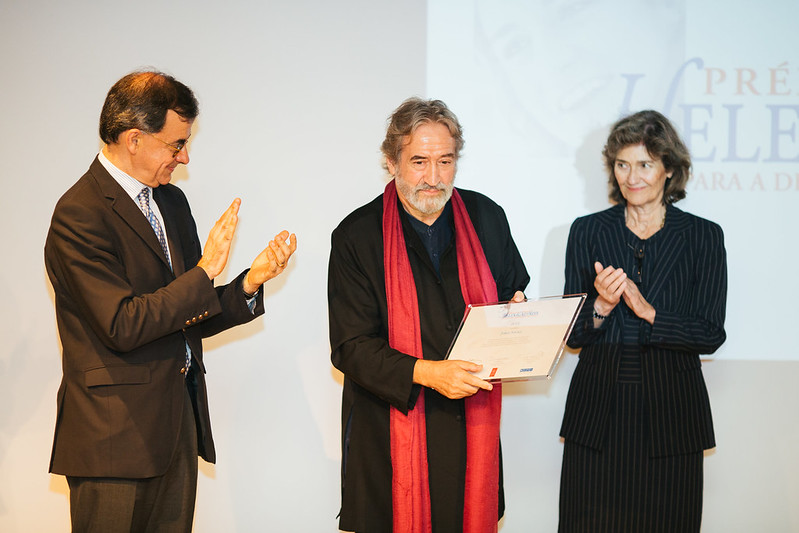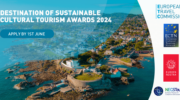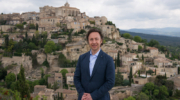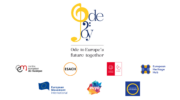Helena Vaz da Silva European Award 2015 presented in Lisbon to Maestro Jordi Savall
Maestro Jordi Savall, the world-renowned musician and conductor from Spain (Catalonia), received the Helena Vaz da Silva European Award for Raising Public Awareness on Cultural Heritage 2015 at a ceremony held on the evening of 12 October at the Gulbenkian Foundation in Lisbon. The event took place the day after the memorable concert ‘A Europa Musical 1500-1700’ which was performed at the Grand Auditorium of the Gulbenkian Foundation by Maestro Savall and his ensemble Hespèrion XXI for an audience of 1,200 people. During the ceremony, Special Mentions of the Jury were presented to the Danish radio and TV journalist Adrian Lloyd Hughes and to the Spanish cultural journalist Rafael Fráguas. The Award, established in 2013 by Centro Nacional de Cultura and Europa Nostra, in cooperation with the Clube Português de Imprensa, acknowledges exceptional contributions by individuals to the promotion of Europe’s cultural heritage, ideals and values.

Heritage, especially musical heritage, as a powerful tool to foster the much needed intercultural dialogue within Europe and between Europe and the rest of the world, was at the heart of the award ceremony and, in particular, of the acceptance speech delivered by the Spanish musician.
“It gives me great joy to receive this European Award. It is an important recognition of my life-long dedication to the recovery and promotion of the musical heritage of the Spanish and European Renaissance and Baroque, which was accompanied by a strong commitment to using music as a tool for stimulating the intercultural dialogue between East and West, and the building of bridges between diverse cultures,” stated Jordi Savall.
“The Helena Vaz da Silva European Award is an important initiative because it highlights the fundamental role of culture and heritage for Europe. Yet, until now, Europe has not given sufficient priority to culture. The European Union cannot only aspire to be an economic, monetary or political union. It must develop also a strong cultural profile and competence, in addition to the national competence of the EU Member States,” stressed Maestro Savall.
“I believe in the power of art and music, as Dostoyevsky believed in the power of beauty. He said that beauty would save the world. But why is it that in a world with so much beauty, with such a rich musical and cultural heritage, we are witnessing so much destruction and so much suffering?” he asked. “In the face of such a dramatic escalation of armed conflicts, an unprecedented refugee crisis and an unparalleled problem of youth unemployment, we – the artists – have a special responsibility. If only we could stop the ‘powerplay of weapons’ and replace it with ‘the dialogue of souls’ through music! Today, even more than in the past, let us indeed use music to nurture the much-needed intercultural dialogue and mutual respect throughout Europe and beyond. And let us make music and culture more central to our society,” advocated Savall.
Maestro Savall received the Award from Guilherme d’Oliveira Martins, President of the Centro Nacional de Cultura who is also Board Member of Europa Nostra, and Teresa Patrício Gouveia, Board Member of the Gulbenkian Foundation, one of the main supporters of this European Award.
“The Award conferred to Jordi Savall recognises the admirable work of an exceptional citizen and artist in the musical field, who has been able to illustrate and develop a dynamic concept of defending and preserving Europe’s heritage and historic memory as living realities, in which the past is enriched in the present and projected as an asset into the future,” noted in his address Guilherme d’Oliveira Martins, who is also the President of the Jury of the Helena Vaz da Silva European Award.
The President of Europa Nostra, Maestro Plácido Domingo, in a congratulatory message read at the ceremony, welcomed the recognition of “Jordi Savall, one of the greatest European musicians of our time” and expressed his great admiration and esteem for “Maestro Savall as an artist, convinced European, enlightened humanist and as a messenger of peace”.
“Maestro Savall has made a huge contribution to promoting a Europe of culture. In the same way, Europa Nostra is convinced that Europe is first and foremost a cultural project,” highlighted Plácido Domingo. “We therefore need to give culture a much more central role within the ongoing process of the building of Europe. And this is even more true today when Europe’s values and ideals are seriously undermined by dangerous forms of fragmentation, divisions and extremism. Europe urgently needs to deploy and unite all its positive resources, forces and voices in order to revive hope and to build bridges between Europeans, as well as between the Europeans and the rest of the world,” advocated the President of Europa Nostra.
Maestro Domingo also expressed the wish that “the Special Mentions of the Jury given to Adrian Lloyd Hughes and Rafael Fráguas will inspire a new generation of cultural communicators across Europe, in the best tradition of cultural activism so dear to Helena Vaz da Silva”.
The Portuguese Secretary of State for Culture Jorge Barreto Xavier, in a video message especially recorded for the event, expressed admiration for the outstanding work carried out by Maestro Savall over 50 years. “Jordi Savall is one of the greatest promoters of the affirmation of the history of music and of ancient musical heritage in the context of the 20th century and its projection for into the 21st century. This tribute to Savall is also a tribute to the role played by European music in the on-going process of the building of Europe,” he stated.
Barreto Xavier also congratulated the recipients of the Special Mentions. “The recognition of two cultural journalists from Denmark and Spain highlights the importance of journalism as an element of the valorisation of culture and heritage,” he added.
Prior to the presentation of the Award to Jordi Savall, the Portuguese musicologist Rui Vieira Nery made a laudatory speech.
A Special Mention of the Jury was given to Adrian Lloyd Hughes by Guilherme d’Oliveira Martins and Dinis de Abreu, President of the Clube Português de Imprensa. “I’m deeply devoted to conveying to the public the endeavours of all artists, artisans and architects. To me, this is what the Helena Vaz da Silva Award is all about: a deep joy in the rich history and heritage that surrounds us, and the firm commitment to preserving it and keeping it vibrant for future generations,” said Hughes, in his thank-you speech.
As Rafael Fráguas wasn’t able to attend the ceremony, Javier Rioyo, Director of the Cervantes Institute in Lisbon, received the Special Mention on his behalf.
The award ceremony was attended by 100 people and conducted by Europa Nostra’s Secretary General Sneška Quaedvlieg-Mihailović.
The European Award for Raising Public Awareness on Cultural Heritage is named after Helena Vaz da Silva (1939-2002), Portuguese journalist, writer, cultural activist and politician, in memory and recognition of her remarkable contribution to the promotion of cultural heritage and European ideals. It is presented annually to a European citizen whose career has been distinguished by activities that disseminate, defend and promote Europe’s cultural heritage, in particular through literary or musical works, news items, articles, chronicles, photographs, documentary features, films, and radio and/or television programmes. The previous laureates of this award are the Italian writer Claudio Magris (2013) and the Turkish writer and Nobel Prize laureate Orhan Pamuk (2014).
Watch Video
Messages
Plácido Domingo
Barreto Xavier
Speeches
Guilherme d’Oliveira Martins
Rui Vieira Nery







